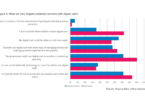Today the Financial Stability Board (FSB) published two papers related to digital currency in preparation for G20 meetings. The first on global stablecoins outlines a long list of current and planned legislation and a timetable. The second focused on cross-border payments and gave central banks a timetable to explore central bank digital currencies (CBDC) for cross-border purposes. The IMF and World Bank will be involved in this.
Simultaneously, a draft G7 statement says no global stablecoins can launch until the regulations are in place, according to Reuters. The interesting point about the G7 statement is how legally enforceable it might be, given those regulations don’t exist. Is it telling governments not to grant licenses until then?
The combination’s net effect is that Libra cannot launch before July 2022 but more likely December 2022 at the earliest. And that’s if it has the appetite for the mountain of legal hurdles in its path.
While the stablecoin report outlines a laundry list of very real risks, it doesn’t emphasize that it is the central banks themselves that are most threatened by the potential challenge to monetary sovereignty. That’s because the topic was out of scope. But it acknowledged that feedback from central banks raised this point as a concern.
The roadmap for cross border payments includes five sets of actions aiming to address current frictions. One of those sets is new payment infrastructures, including central bank digital currencies (CBDC). Last week, the Bank for International Settlements (BIS) Innovation Hub (BISIH) published a paper on CBDC after working with several central banks on their CBDC explorations. From now on, the IMF and World Bank will also be heavily involved where it relates to cross border payments.
The deadline for experimenting with cross currency CBDC payments is December 2022.
Stablecoins – risks and recommendations
Meanwhile, the global stablecoin report outlined a set of ten recommendations for global stablecoins previously published in a report six months ago. Since then, the FSB has conducted consultations.
Those recommendations are global stablecoins:
- should be comprehensively regulated and supervised
- should be regulated in proportion to the risks
- should be regulated internationally through jurisdiction coordination to prevent gaps in oversight
- have governance frameworks which are comprehensive and identify accountability
- have effective risk management for reserves, operational resiliency, cybersecurity, AML/CFT
- have robust systems for safeguarding, managing, storing data
- have recovery plans
- provide transparent information about functions including any stabilization mechanism
- provide legal clarity on the enforceability of redemption rights
- meet all regulatory, supervisory and oversight requirements of any jurisdiction before operating
One of the biggest challenges is the variety of stablecoin designs, and the paper attempts to group them. The serious and perhaps less obvious risks relate to market integrity and confidence.
If a stablecoin achieves scale, the nature of its reserves becomes important. Where the assets are held in treasuries, if the stablecoin needed to suddenly sell a significant proportion of the reserves, it could impact the broader market. Another scenario is where assets are held in bank deposits with known banks. If there is a loss of confidence in a stablecoin, deposit holders might get nervous about the bank’s ability to support withdrawals.
Meanwhile, the laundry list of risks includes challenges for financial stability; consumer and investor protection; data privacy and protection; anti-money laundering (AML); (tax evasion; fair competition and anti- trust policy; market integrity; sound and efficient governance; cyber security and other operational risks; safety of payment systems.
Stablecoins – a lawyer’s fairytale
A key part of the stablecoin report explores current financial standards setters and to what extent their standards might apply. Many will already be familiar with FATF and its reach in terms of anti-money laundering requirements.
Another group is the Basel Committee on Banking Supervision (BCBS), best known for its rules around bank capital adequacy. It’s doing an assessment on how to treat bank exposure to crypto-assets, including different types such as stablecoins. So while the U.S. Comptroller gave banks the green light to hold stablecoin deposits, there’s a risk that the BCBS could disincentivize banks to hold deposits.
The Committee on Payments and Market Infrastructures (CPMI) says that a systemically important global stablecoin would have to comply with the Principles of Financial Market Infrastructures, something that Libra would be aware of.
Local securities regulators such as the U.S. SEC are members of IOSCO. Depending on the stablecoin design, IOSCO says it might be subject to other recommendations for money market funds, client asset protection, exchange traded funds, crypto-assets, financial benchmarks and commodity derivatives.
The paper suggests the issues outlined should also apply to wholesale stablecoins. While Fnality dislikes being classed as a stablecoin, the legislators may consider it as one.
In terms of timing, the four standards bodies will make revisions to standards by the end of 2021. By July 2022, national authorities have to consider the impact of those standards on local regulations. But it doesn’t say they have to implement by then. And in theory, based on the G7 statement, a global stablecoin won’t be able to launch until they have.
Just complying with this list of regulations is enough to keep many lawyers in business. But on top of that, there could be some legal challenges on the horizon. Because the G7 is saying you can’t get going until we’ve issued regulations. But how does that work legally if those regulations don’t exist? Practically it will be through the withholding of licenses. Libra might be able to challenge withholding licenses in court. But it depends on whether it’s willing to get on the wrong side of regulators. So far, it’s been compliant and stated it aims to be so.






